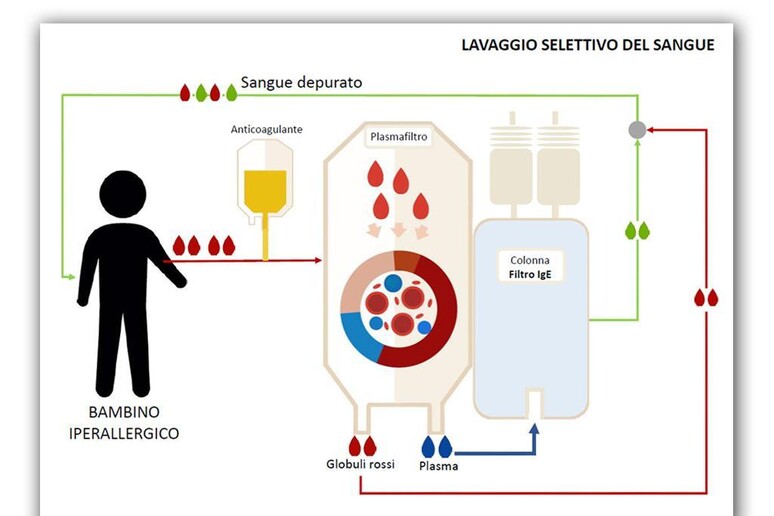A seven-year-old child has been
saved from a serious food allergy by a special "blood wash"
treatment practised for the first time in the world by Rome's
Bambino Gesù children's hospital.
The treatment 'washed' the child's blood of the antibodies
responsible for his condition after pharmaceutical therapies
proved ineffective.
The boy, Michele, suffered a very serious form of allergy
to foods, including milk, eggs, fish and fruit, which combined
with asthma, caused a series of bad fits.
Michele was one of an estimated 600,000 Italian children
who suffer from food allergies every year.
The most frequent allergies are to milk and eggs, though
the conditions often improve as children grow.
Michele's allergy was an "aggravated multiple" kind,
doctors said, in which the level of the immunoglobulin E (IgE)
in his blood, the antibody responsible for the allergy, was so
high he could not take the drug usually prescribed for the
condition, because of a series of serious side effects that
would have manifested if he took it.
The blood wash treatment is not considered a definite
cure, but it has made it possible to bring the condition under
control and significantly increased the boy's quality of life.
As a result, it is a breakthrough that could open up new
options for the treatment of extremely serious allergies such as
the one Michele suffers from.
The paper related to the ground-breaking treatment has
been published by scientific journal Pediatrics.
"The advantage of the new equipment," said Stefano
Ceccarelli, head of the Apheresis Service at Bambino Gesù, "is
that it enables us to eliminate a specific type of antibody from
the blood, in this case the IgE, while maintaining all those
substances that would have been be taken out of the blood
circuit if traditional generic plasma-apheresis had been carried
out.
"Furthermore, thanks to the reduced volume of the blood
that ends up in extracorporeal circulation (80 ml), it is also
fit for patients of low weight, like children".
Alessandro Flocchi, allergology chief at Bambino Gesù,
said:
"This procedure breaks new ground towards the treatment of
allergies and is indicated for all children suffering from all
the most serious forms of allergic disease, anaphylaxis, atopic
dermatitis and serious asthma who cannot take the specific
drugs".
ALL RIGHTS RESERVED © Copyright ANSA











